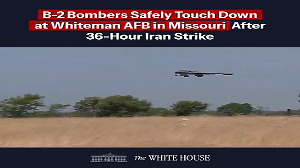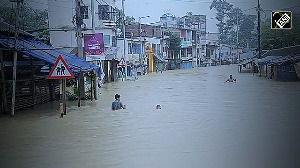Water is a great leveller. Just witness the wasted wetlands of Bihar, and you will know why.
Over here the distinction between man and beast, rich and poor, has got blurred, as both fight for survival against the elements -- living, dying, and even getting buried in much the same way -- in Darbhanga district, which is facing one of the worst floods in recent times.
Embankments, railway tracks and national highways serve as shelter and also, in some cases, as the final resting place.
"My son Naushad was swept away by the Bagmati on the night of July 12, when the river blasted its way through the Sirinia-Bilaspur embankment. It flattened my house and shattered our dreams for him," says Qamrul Naddhaf of Hayaghat between sobs. "We found his body the next day. As there was no dry land, we buried him here," he says, pointing his 25-year-old son's grave out to a visiting PTI correspondent, on the very embankment where they have taken shelter from nature's fury.
Shafiq-ur-Rehman alias Baua Mian, mukhiya of Sirinia panchayat, says three-year-old Sarhi Hamid was buried on the same embankment. "We are burying and cremating our people and cattle on the embankment. The situation is the same all over the district. With carcasses floating everywhere and vultures having a feast, god knows what will happen when the water recedes. First it was the floods, next it maybe epidemic," he says pensively.
There is also another fear, at least for some. Like Vijay Kumar Jha of Sadhwara village, who is haunted by the spectre of the unknown -- ever since he buried a rotting body which floated into his compound, without ascertaining its religion first. "Puja is the only way I can seek forgiveness. I think god will pardon my sin and keep away the ghosts," says a visibly worried Jha as he recites the Hanuman Chalisa even while talking to this reporter.
The flood waters make no distinction between the rich and poor: Jagdish Shah, a prosperous cloth merchant from Hayaghat, is in much the same situation as Naddhaf and thousands of others cowering for shelter on embankments and railway tracks. However, the money he carried on him while fleeing nature's fury comes in handy for cremating unclaimed bodies.
"I have cremated at least five bodies with the help of locals, as there was no administrative help available," he says.
As a vast sea of humanity struggles to make both ends meet, this reporter saw no army boats or government-funded 'khichri centres' functioning. Mohan Paswan of Dilahi village and Baleshwar Sahni of Aman village, who have taken shelter on the Darbhanga-Samastipur road, complain of the administration's "total callousness" in relief distribution.
"In the last 20 days that we have been here, we have only received 100 gm of soaked gram and as much chivda (flattened rice) from the government. We are young and so able to withstand hunger, but what about our children and the old?" rants an angry Paswan amid expletives.





